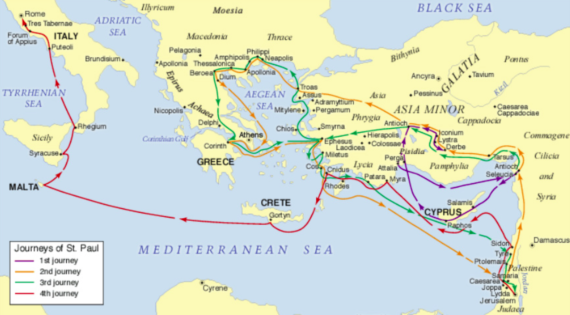Forgiveness is hard. Forgiveness in a modern culture that demands a head for every offense and leaves little room for change and repentance is harder. “Once a sinner, always a sinner” seems to be the motto of the day. A tarnished name never seems to fade, no matter how much effort a person puts into renewal. Sadly, even among Christians, hearing words of judgment for past deeds is more common than forgiveness. We seem more eager to dredge up skeletons than help bury them beneath grace, despite all the many warnings in scripture that Christians are to be quick and eager to forgive.
Surprisingly enough, the early church had a similar problem. Saul, the man who would later come to be known as Paul, had a reputation among the believers in his early days: “3 As for Saul, he made havoc of the church, entering every house, and dragging off men and women, committing them to prison.” Acts 8:3.
But when Saul encountered Christ on the road to Damascus, like so many sinners who come to the cross, his whole world changed, and he repented his sin. He earnestly tried to repair the damage he had caused, even going so far as to try and join the church in Jerusalem to lend his considerable aid. But the church in Jerusalem would not have Saul – at least, not initially. The believers in the city knew who Saul was. Or, more accurately, the believers knew who Saul had been: “26 And when Saul had come to Jerusalem, he tried to join the disciples; but they were all afraid of him, and did not believe that he was a disciple.” Acts 9:26






Everybody remembered what Saul had done to the church. He was a persecutor of the faithful, responsible for many destructive acts against the body of Christ. In modern vernacular: his name was Mud. Despite giving himself to Christ, the Christians rejected Saul because of his past.
The story might have ended there, with Saul sent away, discouraged, feeling as if he could never truly atone for the sins of his past, but thankfully there was a disciple named Barnabas. Barnabas took Christ’s changing power seriously. The next verse in Acts 9 reads: “27 But Barnabas took him and brought him to the apostles. And he declared to them how he had seen the Lord on the road, and that He had spoken to him, and how he had preached boldly at Damascus in the name of Jesus.”
Barnabas looked at Saul’s past, all its sin and every vile deed, and instead of holding it against the new convert, chose to believe in the saving power of Christ. Barnabas gave Saul the same chance Christ had given Barnabas on the cross – the same chance each one of us receives when we repent of our sins.
The rest, of course, is history. Saul, now Paul, would end up writing much of the New Testament. His impact on the church is unrivaled in history – no one would dare to question the sincerity of the man’s repentance. Yet, it was a story that came so close to never being written, all because some wanted to hold Paul’s past against him.
The next time you’re tempted to judge someone’s present by their past, remind yourself of Saul’s path to God – and remember that we all walk under the shadow of God’s forgiveness. As Christ has given us a second chance, we must always be prepared to extend that same grace to others.
“12 Put on then, as God’s chosen ones, holy and beloved, compassionate hearts, kindness, humility, meekness, and patience, 13 bearing with one another and, if one has a complaint against another, forgiving each other; as the Lord has forgiven you, so you also must forgive.” Colossians 3:12-13

